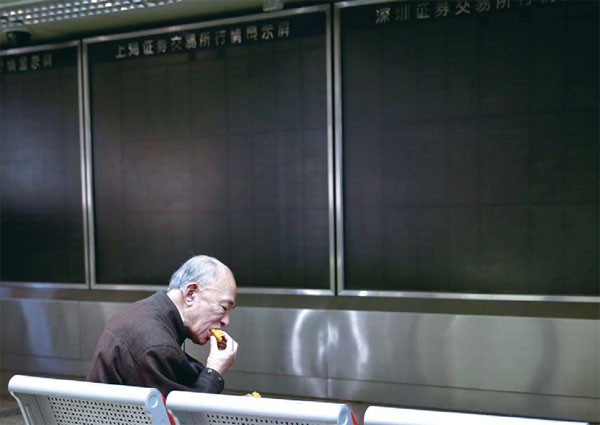New rules planned to regulate share sales
Updated: 2016-01-08 07:57
By Li Xiang(China Daily Europe)
|
|||||||||||
Sell-offs trigger use of new circuit breaker meant to avoid a repeat of summer's crash as investors are urged to be rational and cautious
China will introduce new rules on share sales by major stakeholders in listed companies, to prevent such sales from affecting the country's fragile stock market, the securities regulator said on Jan 5.
The announcement came as the regulator's ban on the sale of stocks by major shareholders to stem the market rout in the summer was set to expire on Jan 8.
|
The boards at a stock trading office in Beijing are switched off on the morning of Jan 7 after Chinese equities plunged by 7 percent, triggering a circuit breaker that halted trading for the rest of the day. Feng Yongbin / China Daily |
The lifting of the ban has been haunting A-share investors, and it was identified as one of factors that caused a massive sell-off on Jan 4. The steep market slide triggered the circuit breaker mechanism that resulted in an unprecedented trading halt of equities, index futures and options.
The circuit breaker was tripped again on Jan 7 as stocks dived again. Media reports have suggested the regulator will extend the current ban until the new rules go into effect. Officials at the China Securities Regulatory Commission declined to comment on the matter.
Two listed companies contacted by China Daily said they have not received any notice from the regulator or stock exchanges about the extension of sales ban.
Deng Ge, a spokesman for the commission, said on Jan 5 that the new regulations would include a pre-disclosure system, selling restrictions, and mechanisms such as block trading and private negotiations to reduce the negative impact on the capital market.
Some analysts earlier estimated that the value of capital involved in share sales by major shareholders in listed companies could amount to 1.2 trillion yuan ($183 billion; 170 billion euros).
Dong Dengxin, a securities researcher at Wuhan University of Science and Technology, says overvalued small-cap stocks would be the worst hit if the ban is revoked.
"There is a strong motivation to sell the expensive small-cap stocks, as the average price-to-earning ratio of companies listed on the startup board has reached 109 times," he says.
As of the afternoon on Jan 5, at least five listed companies had promised that their controlling shareholders and senior executives would not reduce their equity holdings.
Meanwhile, an online survey by Internet company Tencent has revealed strong pessimism among investors toward the stock market in 2016. A resounding 61 percent of the 40,000 investors polled said they are negative about the A-share market, with just 22 percent positive.
The survey came after the stock market suffered a slide on the first trading day of 2016, triggering the new circuit breaker system.
Twenty-seven percent of the investors cited the mechanism as the main reason for the market slide, while 33 percent believed that the anticipated expiration of the ban on major shareholders from selling their holdings had triggered the sell-off.
More than 40 percent said they were trapped by the sudden market plunge and would wait passively for the market to rebound, while 44 percent said they had a full stock position.
The plunge of Chinese equities on Jan 4, marking the worst-ever start to a new year, startled investors who sought to dump shares to avoid further volatility. Nearly 1,400 stocks in both Shanghai and Shenzhen tumbled by the 10 percent trading limit.
The sell-offs were widely regarded as rare and historic events in the Chinese stock market, since they first triggered the circuit breaker mechanism that became effective that day.
Chinese equities dived on the morning of Jan 7 again, triggering the 7 percent circuit breaker, which halted trading of equities, index futures and options for the remainder of the day. In less than 30 minutes after the markets opened, the CSI 300 Index plunged by 7 percent, after resuming from a 15 minute trading halt when it triggered the first trading halt.
The rule was the first introduction of an emergency brake mechanism by the Chinese regulator to calm the market when it experiences abnormal price swings.
According to the rule, trading should be suspended for 15 minutes when the CSI 300 fluctuates by 5 percent. Trading will be halted for the remainder of the day when the index moves by 7 percent at any time during the trading session.
Analysts say the A-share market has also been burdened by a slew of negative factors, including disappointing economic data, a weaker yuan and fluctuations in the global markets.
lixiang@chinadaily.com.cn
(China Daily European Weekly 01/08/2016 page25)
Today's Top News
Going mobile
Wealth of options for China's super-rich
Man with knife shot dead outside Paris police station
Trading halted after shares fall 7% in opening minutes
China voices its 'resolute opposition' to DPRK test
Design exhibition to attract Chinese art works
Germans shaken by mass attacks on women
Concerns grow over Saudi-Iranian rising tensions
Hot Topics
Lunar probe , China growth forecasts, Emission rules get tougher, China seen through 'colored lens', International board,
Editor's Picks

|

|

|

|

|

|







